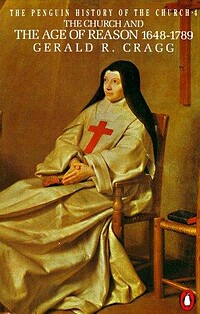Status
Available
Call number
Description
"Assessment of this formative period ranges from the Church life of France under Louis XIV to the high noon of rationalism and beyond, and also includes a chapter on Christianity and culture in the Baroque age."--Cover.
User reviews
LibraryThing member stillatim
I had begun to think this book had taught me nothing at all--Cragg works in the historiographical tradition of "allude to names, ignore biography", so there's lots of "The evidence that a new day had dawned was furnished by the respect with which Cardinal Consalvi was received at the Congress of
That said, I was able to work out a reasonable narrative from the book as a whole: the power of the state rises throughout this period, with the church often losing power (even, he suggests, in places like Spain, otherwise a strong supporter of Rome). This is aided by the tide of rationalism, deism and so on, which undermined the justifications for church power. And then, after the French revolution and its consequences, the restored monarchies or states took on the solid-seeming traditionalist mantle of religion: Catholicism in France, Protestantism elsewhere.
So, in the eighteenth century, we see Christian churches slowly lose power and influence, while the state gains it; after the revolutions, the church and state come together to create a very new, 'traditional' body of power. And that works wherever you look--the nineteenth century Anglican church was buried deep in the political structures of England; Catholicism was buried deep in the political structures of France and Spain, and so on and so forth.
No doubt this is the kind of wild generalization that will infuriate better informed contemporary scholars, but at least I got something from the book other than a chuckle at Cragg's deep repugnance for Unitarianism. Poor unitarianism.
Show More
Vienna." Aside from the slightly tortuous syntax, that's the only mention of Cardinal Consalvi in this book, and it comes in the Epilogue. So a fair bit went over my head. That said, I was able to work out a reasonable narrative from the book as a whole: the power of the state rises throughout this period, with the church often losing power (even, he suggests, in places like Spain, otherwise a strong supporter of Rome). This is aided by the tide of rationalism, deism and so on, which undermined the justifications for church power. And then, after the French revolution and its consequences, the restored monarchies or states took on the solid-seeming traditionalist mantle of religion: Catholicism in France, Protestantism elsewhere.
So, in the eighteenth century, we see Christian churches slowly lose power and influence, while the state gains it; after the revolutions, the church and state come together to create a very new, 'traditional' body of power. And that works wherever you look--the nineteenth century Anglican church was buried deep in the political structures of England; Catholicism was buried deep in the political structures of France and Spain, and so on and so forth.
No doubt this is the kind of wild generalization that will infuriate better informed contemporary scholars, but at least I got something from the book other than a chuckle at Cragg's deep repugnance for Unitarianism. Poor unitarianism.
Show Less
Subjects
Language
Original publication date
1960
Similar in this library
DDC/MDS
| 270.7 CRA |
Pages
299
